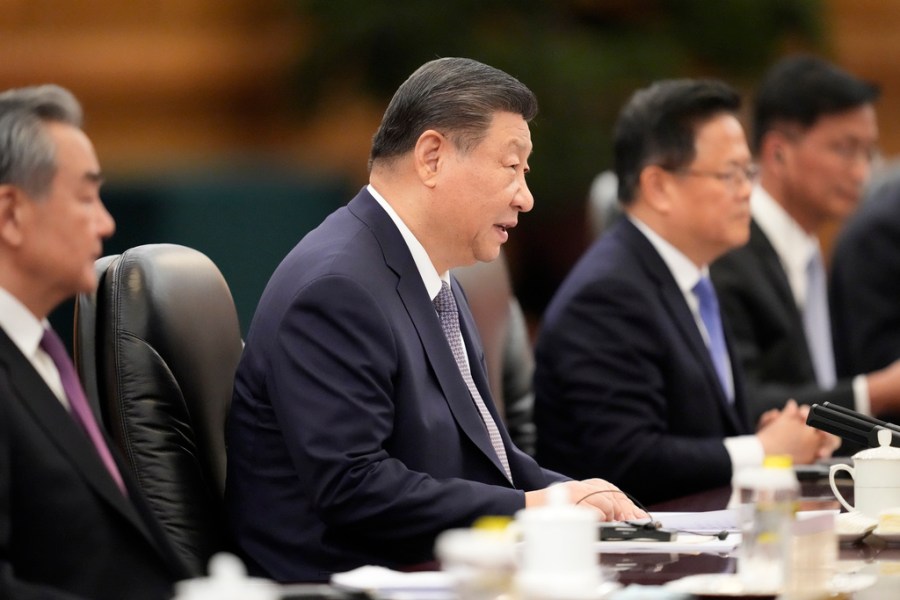
With President Trump’s inauguration coming up soon and Beijing already levying new export restrictions and sanctions, 2025 promises to be an eventful year for the U.S.-China trade war. And while the impact is likely to be widespread, Beijing is explicitly targeting the American defense sector.
The actions by China are forcing a reckoning with the uncomfortable reality that America has outsourced large parts of its military supply chain to President Xi Jinping and the Chinese Communist Party. Breaking this dependency will require incentivizing the private sector to find and create alternatives.
Successfully infiltrating an adversary’s supply chain presents opportunities to conduct devastating acts of sabotage. Last September’s detonation of thousands of Hezbollah pagers and walkie-talkies by Israel is a prime example. It also enables exceptionally effective espionage. After covertly acquiring a company that sold cryptography machines, American and West German intelligence were able to read the classified communications of dozens of countries for the next half century.
Such coups typically require significant effort and no small amount of luck. Sometimes nations inadvertently compromise themselves. Germany and Japan’s widespread use of forced labor during World War II gave their prisoners ample opportunity to sabotage the production of everything from munitions to aircraft and warships.
But the U.S. may be the first country to deliberately outsource its military supply chain to an adversary in exchange for cost savings.
The scale of the U.S. military’s dependence on China is staggering. Carriers, missiles, aircraft, missile defenses and tanks all rely on components or materials sourced from the People’s Republic. China is the largest foreign supplier of critical technologies for the Department of Defense, ahead of even close allies like the U.K. and Japan. Greg Hayes, the CEO of Raytheon, has stated that it would be impossible for him to decouple from China, as his company relies on thousands of suppliers there.
This dependency gives China unprecedented leverage. It leaves critical military equipment vulnerable not only to sabotage, but also to the risk that Beijing decides to simply close the spigot, depriving American companies of the inputs they rely on. And President Xi makes no secret of his intention to wield foreign dependency as a weapon.
Washington is attempting to unwind this risk. In 2022 the Defense Department released recommendations for securing critical supply chains and recently followed up with a National Defense Industrial Strategy. Initiatives like the CHIPS Act and Pentagon contracts awarded to American and Australian rare earth mining companies will help rebuild capacity.
These are steps in the right direction, but truly solving the problem will require more than central management from Washington. It will require incentivizing the private sector to do what it does best — develop innovative solutions in response to market demand.
The defense industry relies on Chinese suppliers for the same reason other U.S. companies do. They are frequently cheaper and, after decades of offshoring, domestic alternatives may no longer exist. When Hayes describes decoupling as “impossible,” what he really means is that it would be expensive and take time.
Congress and the Pentagon need to make it clear that a failure to decouple will be even more costly. Legislation should set a target date by which all weapons and equipment are free from Chinese inputs. It should include annual reduction milestones and heavy fines for failure to meet them. Sufficient pressure on their bottom line will undoubtedly inspire solutions to this “impossible” problem. Knowing that defense companies are required to purchase from domestic and allied suppliers will also incentivize investment by firms eager to compete for their business.
To understand the true scope of this problem, Congress should also pass the Taiwan Protection and National Resilience Act. This bipartisan legislation directs the secretary of Defense to submit reports identifying military procurement dependencies on China and plans to reduce them. Public hearings should be held. The American people deserve to know the extent of their military’s dependence on China, as well as how much of the U.S. defense budget is subsidizing Chinese industry.
By sabotaging just pagers and radios, Israel was able to inflict thousands of casualties on Hezbollah and shatter the terrorist group’s ability to coordinate. Meanwhile, China has been handed indirect access to much of what the U.S. military uses. It is inconceivable that Beijing has not taken advantage of this opening to compromise the integrity of American military hardware. Nor do we have to wonder what the impact would be if President Xi follows through with his threat to halt exports. In October he fired a warning shot, sanctioning Skydio, an American drone maker whose customers include the U.S. military. The downstream impact was immediate. Within days Skydio started rationing batteries, which it sources from China.
As long as Beijing has the ability to manipulate or shut down exports upon which the American military depends, it has the power to disarm the U.S. As Trump and his national security team prepare to take office, removing this leverage must be a top priority. China must not be allowed to hold America’s national security hostage.
Dan Nidess is a former Marine captain, veteran of the war in Iraq, and former product manager at the Defense Innovation Unit. He currently works in the tech sector.












